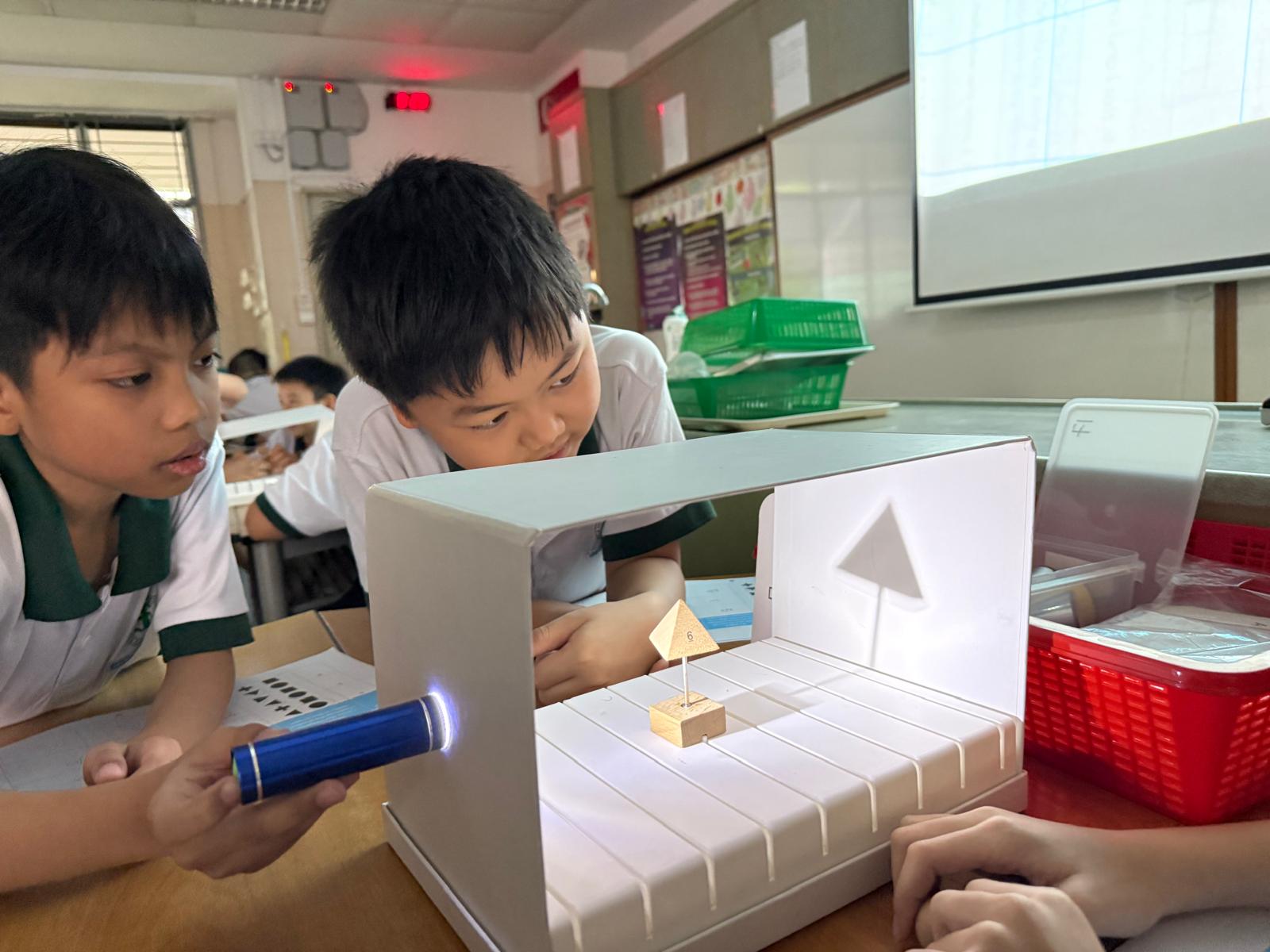Science
At our Science Department, we tap on students’ natural curiosity and adopt an inquiry-based, student-centred approach in line with the Primary Science Curriculum Framework. Students construct their understanding of scientific concepts and develop process skills through hands-on exploration, guided questioning, and evidence-based reasoning. They are encouraged to investigate the world around them, ask meaningful questions, and test their ideas systematically. Through this process, they acquire not only scientific knowledge but also key process skills, ethics, and attitudes—such as perseverance, responsibility, and integrity—which are essential to the Practice of Science and lifelong learning.
Collaborative Inquiry
Students take ownership of the inquiry process as they work together to plan and investigate ideas respectfully and evaluate their results to make a conclusion.

Joy of Learning
The teaching and learning of Science go beyond the classroom, providing students with opportunities to engage in authentic, real-world tasks. Learning through play is also incorporated, allowing students to explore concepts actively while assessing their own understanding and that of their peers.
Gamification in Science
Incorporating games into Science lessons brings joy to learning and boosts student engagement, helping to deepen their understanding of key concepts. These games are thoughtfully designed by teachers to match students’ readiness levels and provide meaningful opportunities for them to take greater ownership of their learning.
Learning Beyond the Classroom
Eco-trail @FVPS
An immersive trail within the school grounds that connects students with local biodiversity and ecological concepts.
Discovering Biodiversity at Mandai Wildlife
Primary 3 students embarked on a journey to appreciate the rich biodiversity in our natural environment. Through a learning journey to Mandai Wildlife and an interdisciplinary trail with a focused Science lesson, they explored local ecosystems and observed a variety of animal species up close. These experiences sparked curiosity about life’s diversity and helped students understand how organisms contribute to ecological balance. Through observation and exploration, they began to develop a sense of stewardship for nature, recognising their role in protecting the environment and its living things.
Growing Ideas for a Food Sustainability
Aligned with the Singapore Green Plan 2030, Primary 4 students embarked on a series of learning experiences to explore the theme of Food Sustainability. Through the Hydroponics Programme and visits to Koh Fah Farm, Metro Farm, and VidaCity, they discovered innovative soil-less farming and urban agriculture practices that contribute to local food resilience. These experiences were further enriched by the Applied Learning Programme (ALP-IPW), where students applied design thinking to develop creative solutions for reducing food waste and promoting responsible consumption. Together, these opportunities nurtured critical thinking, encouraged responsible action, and inspired students to play a part in building a more sustainable future.
Hydroponics Programme
The Hydroponics Programme introduces students to sustainable farming by
growing vegetables without soil. Through hands-on activities, they explore
how science supports food security and develop a sense of environmental
responsibility.
Exploring Plant Reproduction and Energy Conservation
At Gardens by the Bay, Primary 5 students explored how plants reproduce
through various methods such as seed dispersal and flowering, connecting
their classroom learning to real-life examples in a rich natural setting.
They also learned how the Supertrees demonstrate energy conservation by
harnessing solar power and supporting sustainable ecosystems. This immersive
experience deepened their understanding of both plant biology and environmental
responsibility, inspiring them to adopt eco-friendly habits and contribute
to a more sustainable future.
Urban Greening: Positive Impact on our Environment
Primary 6 students embarked on learning journeys to Bishan-AMK Park, Pasir-Ris Mangrove Boardwalk, and the Singapore Botanic Gardens’ Rainforest to deepen their understanding of ecosystems, adaptations, and human impact on the environment. Through collaborative tasks, they explored issues such as deforestation, pollution, and climate change, examining how human actions affect natural systems. Common themes of conservation, sustainability, and innovative land use were highlighted across the three sites, encouraging connections to Singapore’s future environmental challenges. These experiences nurtured environmental responsibility and strengthened students’ critical thinking, communication, and collaboration skills.
Challenging our Young Inquirers
Science Excellence 2000 (E2K) Programme
The E2K Science Programme provides selected Primary 4 and 5 students with opportunities to explore advanced scientific concepts through inquiry-based investigations. Students engage in open-ended tasks that develop critical thinking, inventive problem-solving, and scientific communication. The programme nurtures curiosity and strengthens students’ ability to work collaboratively to study phenomena, investigate possible causes, and discuss ideas using scientific reasoning. Through this process, students build strong scientific dispositions while acquiring 21st-century competencies essential for future-ready learners.
Elementz Science Project Competition
The Elementz Science Competition, organised by Anderson Secondary School,
offers students an engaging platform to apply their scientific knowledge
and skills in creative, challenging ways. Through hands-on tasks, collaborative
problem-solving, and critical thinking, students explore key science concepts
and deepen their understanding of real-world applications. These competitions
foster a love for science while nurturing teamwork, perseverance, and innovation.

